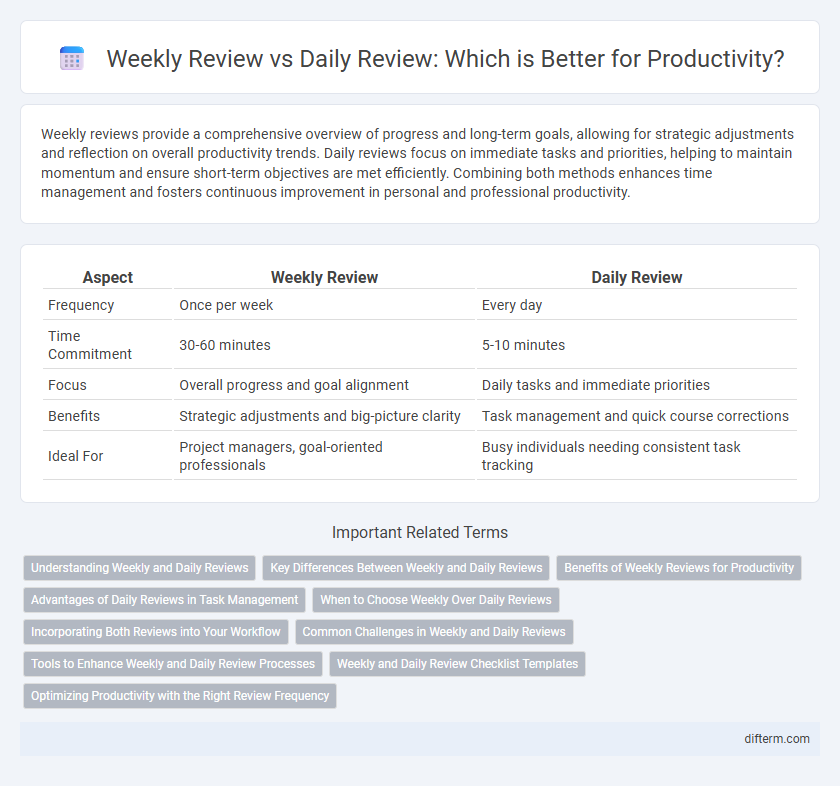Weekly reviews provide a comprehensive overview of progress and long-term goals, allowing for strategic adjustments and reflection on overall productivity trends. Daily reviews focus on immediate tasks and priorities, helping to maintain momentum and ensure short-term objectives are met efficiently. Combining both methods enhances time management and fosters continuous improvement in personal and professional productivity.
Table of Comparison
| Aspect | Weekly Review | Daily Review |
|---|---|---|
| Frequency | Once per week | Every day |
| Time Commitment | 30-60 minutes | 5-10 minutes |
| Focus | Overall progress and goal alignment | Daily tasks and immediate priorities |
| Benefits | Strategic adjustments and big-picture clarity | Task management and quick course corrections |
| Ideal For | Project managers, goal-oriented professionals | Busy individuals needing consistent task tracking |
Understanding Weekly and Daily Reviews
Weekly reviews provide a comprehensive overview of long-term goals, progress, and areas needing adjustment, allowing for strategic planning and prioritization. Daily reviews focus on immediate tasks, deadlines, and short-term productivity, ensuring alignment with daily objectives and efficient time management. Understanding the distinct roles of weekly and daily reviews enhances overall productivity by balancing big-picture reflection with actionable steps.
Key Differences Between Weekly and Daily Reviews
Weekly reviews provide a comprehensive overview of long-term goals, project statuses, and priority adjustments, enabling strategic planning and time allocation for the upcoming week. Daily reviews focus on immediate tasks, deadlines, and short-term priorities to optimize daily productivity and manage workload effectively. The key difference lies in the scope and granularity, as weekly reviews offer a broader perspective on progress, while daily reviews emphasize tactical execution and real-time task management.
Benefits of Weekly Reviews for Productivity
Weekly reviews provide a comprehensive overview of progress, enabling better prioritization and strategic adjustments for upcoming tasks. They help identify patterns and recurring challenges that may be overlooked in daily assessments. This practice enhances long-term goal alignment and reduces stress by allocating dedicated time for reflection and planning.
Advantages of Daily Reviews in Task Management
Daily reviews enhance task management by providing real-time insights, enabling immediate adjustments to priorities and deadlines. This frequent reflection reduces the risk of overlooking tasks and improves time allocation, ensuring consistent progress. Regular daily check-ins foster accountability and help maintain momentum towards short-term goals.
When to Choose Weekly Over Daily Reviews
Weekly reviews are ideal when managing complex projects that require strategic planning and reflection on long-term goals, as they provide a broader overview of progress and pending tasks. They allow for deeper analysis of accomplishments and adjustments to priorities, which daily reviews may overlook due to their focus on immediate tasks. Choose weekly reviews over daily when your productivity depends on aligning daily activities with overarching objectives and when minimizing review frequency helps maintain workflow momentum.
Incorporating Both Reviews into Your Workflow
Incorporating both weekly and daily reviews enhances productivity by balancing immediate task management with long-term goal tracking. Daily reviews allow for quick adjustments and prioritization of urgent tasks, while weekly reviews provide a comprehensive overview to assess progress and plan ahead effectively. Combining these practices ensures continuous alignment with objectives and fosters sustained workflow efficiency.
Common Challenges in Weekly and Daily Reviews
Weekly reviews often struggle with information overload, making it difficult to prioritize tasks effectively and maintain clear focus on long-term goals. Daily reviews face challenges such as insufficient time allocation, leading to shallow reflections and missed opportunities for adjusting plans according to real-time changes. Both review types benefit from structured frameworks that enhance clarity and consistency in evaluating progress.
Tools to Enhance Weekly and Daily Review Processes
Digital tools like Notion and Todoist streamline weekly reviews by consolidating tasks, notes, and goals into integrated dashboards that offer comprehensive progress tracking. For daily reviews, apps such as Microsoft To Do and Google Calendar provide real-time task management, reminders, and priority sorting to maintain daily focus. Utilizing automation features within tools like Zapier or IFTTT can further enhance both review processes by syncing data across platforms, ensuring seamless updates and reducing manual input.
Weekly and Daily Review Checklist Templates
Weekly review checklists provide a comprehensive overview of completed tasks, upcoming deadlines, and goal progress, allowing for strategic adjustments and long-term planning. Daily review checklist templates focus on prioritizing immediate tasks, tracking time management, and resolving daily obstacles to maintain consistent productivity. Combining weekly and daily review templates enhances workflow efficiency by balancing short-term action with long-term objective alignment.
Optimizing Productivity with the Right Review Frequency
Daily reviews enhance immediate task management by allowing rapid adjustments and prioritization, boosting short-term productivity. Weekly reviews provide a broader perspective, facilitating strategic planning and long-term goal alignment to optimize overall workflow efficiency. Selecting the right review frequency depends on individual work complexity and the need for balancing immediate responsiveness with comprehensive progress tracking.
Weekly review vs Daily review Infographic

 difterm.com
difterm.com